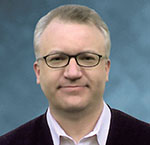Bill Siwicki
Dr. Terri Shieh-Newton, a member at global law firm Mintz, discusses some of the challenging questions that arise when deploying AI, and offers some perspective for healthcare and technology leaders.
Signs point to yes – and mature remote patient monitoring and telemedicine tools will be key to helping providers capitalize on the shift, one technology leader says.
Incorporating cloud-native architecture, agile methodologies, product-driven development and DevOps all are needed, says Dr. Melek Somai, CTO at Inception Health, a subsidiary of Froedtert Health.
"As AI capabilities continue to improve, health systems will be able to provide a more seamless, coordinated and comprehensive experience for each patient," says the chief technology officer of BD.
Generative AI can help recruit the next generation to work in the healthcare industry by simplifying difficult and labor-intensive processes, one physician AI expert states.
The healthcare lead at research and consulting giant Accenture lays out how to get proprietary data ready, establish the right controls and harmonize people with the tech.
Success Stories & ROI
That's been in med-surg and the ICU. In the ED, the health system has discharged 63% of its patients to outpatient plans with the help of telepsychiatry.
In one example, RPM helped detect impending potentially fatal adverse events 18 hours in advance of readmission. A wearable sensors expert discusses the benefits of RPM in cancer care.
How is the technology being used, and how should health IT leaders respond? Venky Anant, a partner at research and consulting firm McKinsey Digital, has some answers.
A healthcare-scheduling expert explains how intelligent tools can save providers time and money by optimizing physician capacity, accelerating patient access and cutting unnecessary staff training and administration.










